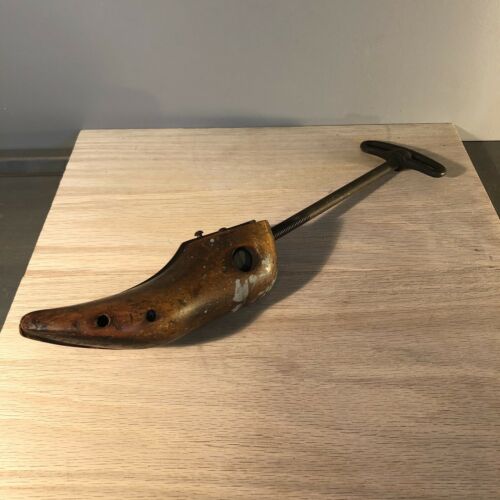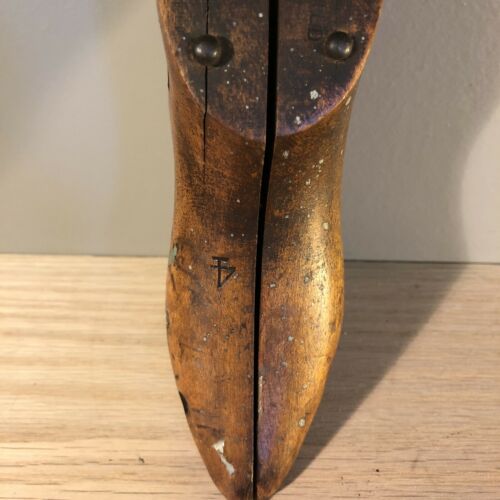-40%
Vintage 1920’s George Belcher - Stoughton Mass. Shoe Mold Stretcher Cobbler “4”
$ 10.56
- Description
- Size Guide
Description
This is a vintage 1920’s George E. Belcher wooden shoe model / stretcher. It is believed to be 1920’s or earlier from his factory in Stoughton, Massachusetts. It is marked “4” on it for the size. It is also marked “PATENTED” and “G.E. BELCHER STOUGHTON” in the wood.It is in excellent condition with no cracks or chips or broken or missing parts. It appears that there is some paint drips that got on it at some point that will be easy enough to remove, but I wanted to leave that up to the buyer, since it is a matter of preference.
The patina on this piece is AWESOME! It has the look! FREE SHIPPING!!
Enjoy!!
History:
GEORGE EDWARD BELCHER (1850-1924)
Of unusual character, totally unspoiled by prosperity, with the dominant trait of consistent consideration for his fellows, George E. Belcher rose from a minor position in the shoe trade of Stoughton, Massachusetts, and of New England, to foremost rank in the industry, setting the standard of quality and service in the conduct and operation of his company. No part of his wealth was derived from any other man's loss, but, rather was a large part of it expended in advancing the interests of his associates. He was a pioneer in introducing welfare policies for his employees, and by his inspiring leadership created an admirable morale and esprit de corps in his organization. Of wide and varied interests, Mr. Belcher was a substantial landowner throughout the district, active in civic affairs and a deep student of science and natural history to which he devoted much study and interest. His career was replete with hardships and full measure of difficulties, and he had not greater advantages than the average boy of his age and time, but with his diligent application, sincere devotion to his daily tasks and a natural ability combined with a commanding personality, he surmounted the barriers which beset his path to achieve substantial and distinguished success in his chosen field.
The Belcher family is of ancient and historic origin, tracing to the early days of Henry VIII of England , when Edmund Belcher, of Norman descent, is recorded as a resident of Guilsborough, Northamptonshire, England. The first progenitor of the family in America was Gregory Belcher, who came to New England in the first quarter of the seventeenth century, and was later made a freeman in 1640, settling in Braintree, Massachusetts. From him is descended his son, Joseph; his son, Edward; his son, Clifford; his son, Joseph; and his son, Sarda. Among the noted members of the family was Jonathan Belcher, who was sent to England, in 1730, as a representative of the Massachusetts Bay Colony, and made such a favorable impression upon George I, King of England, that the latter appointed him Governor of his native province. Sarda Belcher, born in 1803, and died in 1869, married Eveline Blunt Leighton. They had a son George Edward, of whom further.
George Edward Belcher was born in Canton, Massachusetts, November 8, 1850. He spent his youth in Stoughton , Massachusetts, where he attended the local public schools. When he was fifteen his father became unable to work because of ill health, and the son was forced to discontinue his formal education to take his place in the industrial world. After a year of intermittent and desultory work, he decided to learn a trade, and his first apprenticeship was with a manufacturer of piano keyboards at Deep River, Connecticut, with whom lie remained for two and a half years. At the end of that time, he transferred to the Hallet and Davis Company of Boston, and thereafter to the Smith Organ Factory. His health became undermined with this type of confining work, and he found it necessary to spend two years on a farm in Easton, Massachusetts, where he engaged also in contracting on timberlands. This out-of- life built up his strength and within a short time he returned to Stoughton , Massachusetts, and entered the employ of the Dale, Walker and Phinney Last Company, embarking thereby upon his career as last-maker in which he was destined to attain an outstanding reputation and record. At first his duties were shaving lasts, and being alert and an apt student, he soon mastered the intricacies of the manufacture and the conduct of the business, rising with rapid gradation through the various departments of the industry. At the end of twenty years, his importance was so formidable and his ability so pronounced that he purchased the entire plant in which he was employed and incorporated with the new company as the George E. Belcher Company, with himself as president and treasurer. With full appreciation and knowledge of the opportunities for expansion, Mr. Belcher erected a completely new plant, and on four later periods made further additions to meet the demands of increasing foreign and domestic business. Under his careful and skilful management and direction his company became the largest exclusive manufacturer of men's welt last in the world.
He possessed noted inventive genius, and found a productive outlet for his talents in the creation of various labor-saving devices for his factory, the most important of which was the "Belcher Last Block Fastener," which still is in use in making all block lasts and has been left unchanged by all later improvements. He was also the patentee and manufacture of several varieties of articles, such as shoetrees, shoe-stretchers, hinge-lasts, and hollow-fillers. In conjunction with this, he also engaged in the manufacture of shoes for some time. In the interests of his company, lie was ever active in bringing about and establishing policies for the benefit of his workers, and his is the distinction of being one of the first New England manufacturers to introduce life insurance and group insurance for his employees. A characteristic attitude, that "a good apprentice is most likely to make a good citizen," was the keynote of his policies and principles. In addition to his business, Mr. Belcher had large interests in real estate and banking, being for many years one of the largest taxpayers of Stoughton . 'He was a founder, for some time president, and for nearly thirty years a member of the board of directors of the Stoughton Co-operative Bank, and was also a member of the directorate of the Neponset National Bank.
Ever interested in academic fields, Mr. Belcher's greatest activity was in the study of natural history, particularly ornithology. He devoted much of his spare time in this work, and made a valuable collection of birds, most of which he mounted himself and which has been generally recognized as the finest and largest private collection of its kind in New England. So profound and comprehensive was his knowledge, and so accurate and scientific were his observations, that for many years prior to his death, he was considered among the foremost ornithological authorities in this country. Because of his ability and interest in this science he was elected a life-member of the Massachusetts Audubon Society. Mr. Belcher was also a member of the Boston City Club, the Boston Boot and Shoe Club, and one of the founders, a charter member and a former president of the Chicatabut Club.
On November 29, 1870, Mr. Belcher married Elva Arminell Pope, a daughter of Edmund Pope, of Stoughton, and they became the parents of a daughter, Gertrude Hervey Belcher (1872-1966).
Death ended the career of George Edward Belcher in Cambridge, Massachusetts, August 28, 1924 , at the age of seventy-four years. He had been an exemplar of devotion to his life tasks, of solicitous attention and consideration to his family, of loyal service to his community, and of faithful adherence to the ethical principles of life in his every phase of endeavor, business, social and civic. A touching and fitting tribute was embodied in a resolution adopted at his death, by the officers of his company to which he had given the best years of his career:
To know him and to work with him was an inspiration and a delight; his mind was keen, active, inventive, and of world-wide distinction; his counsel unfailingly sound and helpful; his disposition ever cheery; more thoughtful and sparing of others than of himself.



















